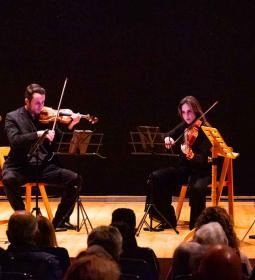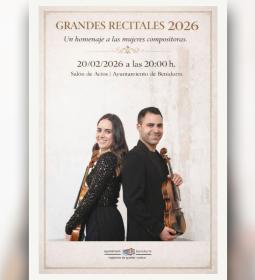Attendees heard the premiere of the work 'Passejant per l'Ermita', composed by musician Josep Cano to give to the people of Benidorm for their anniversary
SM L’Illa offers a musical journey through the history of Benidorm on the occasion of its 700th anniversary

Benidorm Cultural Center Auditorium hosted a concert yesterday evening, Sunday, with which the Societat Musical L'Illa de Benidorm took all attendees on a journey through time, from prehistory to the years of the tourism boom, as part of the events commemorating the 700th anniversary of the founding of Benidorm as a municipality with its legal entity. The recital, directed by L'Illa's artistic director, Felipe Juan Lanuza, also featured experts in various fields and also served as the premiere of the fantasy for band "Passejant per l'Ermita," composed by musician and composer Josep Cano as a gift to the people of Benidorm to coincide with the celebration of seven centuries since the granting of the Carta de Poblament by Admiral Bernat de Sarrià on May 8, 1325.
The mayor of Benidorm, Toni Pérez, was responsible for collecting the score for this work from Cano himself, to applause and the attentive gaze of an audience that practically filled the auditorium. Among those present were the Councillor for Culture, Jaime Jesús Pérez, and other members of the Municipal Corporation; the institutional representative of L'Illa, Tolo Teuler; The queens of the 2025 Festes Majors Patronals, Paula Pascual Sánchez and Aitana Pérez Gutiérrez, and their court of honour; the presidents of the Festes Commission and the Association of Verge del Sofratge Penyes, Susana Martínez and Jonathan López de las Huertas; as well as many people who enjoyed and applauded every one of the pieces included in the program.
The concert program, presented by Angélica Pérez Soria, began with an introduction to the prehistory of Benidorm by Javier Fernández López de Pablo, a professor at the University of Alicante and PhD in History. He spoke about the excavations he led in 2010 and 2011 in the Abric de la Cantera cave in the Serra Gelada mountains, and the remains found, which suggest that people already lived there 25,000 years ago. The musical accompaniment was the symphonic poem "Stonage," composed in 2017 by Sara Galiana.
The second stop on this tour, "Temps de Roma," combined explanations about the Roman "Castellum" of Tossal de La Cala by Victoria Blázquez, head of the Benidorm Municipal Archive, with a performance of a selection from the soundtrack of the 1959 film "Ben-Hur," composed by Miklós Rózsa.
"Benidorm 1325. Carta de Poblament" was the third stop, which featured Professor and Doctor of Catalan Philology Pasqual Almiñana, who shared the most relevant aspects of this document and its history with those present. His presentation was completed with a performance of the Christian march "Bernat de Sarrià," composed in 2001 by Josep Cano, accompanied by several musicians from the Virgen del Sufragio Musical Group.
The fourth work that the L'Illa musicians offered to the public was the symphonic poem "Danza Oriental" (1946) by José María Izquierdo, within the section entitled "Atacs piràtics" (Pirate Attacks). In it, Álvaro Romero Pérez, ambassador to the Moors and Christians Embassy in Benidorm, played the corsair Salah Rais, an officer of the fearsome Barbarossa preparing an attack on various towns in the western Mediterranean, including Benidorm. He introduced the legend of the so-called Cova de la Dona, nestled in the Serra Gelada.
Beatriu Fajardo de Mendoza was the next protagonist, as lady of the Barony of Polop, driving force behind the Reg Major de l’Alfàs or Séquia Mare (Major Reg of the Alfàs) that brought water to the city and architect of the repopulation of Benidorm, thanks to the granting of the second Carta de Poblament (Poblament Charter) on April 8, 1666, as Professor Francisco Amillo explained to those present. This stage was accompanied by the premiere of Josep Cano's "Passejant per l'Ermita" (Passer through the Hermitage).
Francesc Xavier Llorca Ibi, PhD in Catalan Philology and professor at the UA (University of Catalonia), was in charge of speaking about "The Demographic Growth" of Benidorm from the granting of that 17th-century document onward. L'Illa accompanied the pasodoble "Flores Españolas" (Spanish Flowers) (1963) by Pedro Guzman Cárcel.
The last to speak were the queens of the 2025 Festes Majors Patronals, Paula Pascual Sánchez and Aitana Pérez Gutiérrez, who discussed Benidorm's transformation thanks to the "Tourist Boom" as an introduction to a selection of songs that won the Benidorm Song Festival, including the legendary "La vida sigue igual" by Julio Iglesias, with arrangements by Josep Antón.
The mayor of Benidorm, Toni Pérez, was in charge of closing the event. He did so by congratulating the SM L'Illa for the "extraordinary concert" she gave and thanking the musician Josep Cano for the composition he had presented to the city on the occasion of its 700th anniversary. Pérez explained that "as we have been explaining, and as has also been made clear here, Benidorm existed long before May 8, 1325, but it was from that date onwards that it acquired its legal entity." He also noted that "besides its name, we can be certain that if there's one thing that has barely changed from then until today, it's the island that stands out in our bay, l'Illa." Afterwards, he wished the members of the musical society that bears his name a successful history as long as this geographical feature.
The performance of the Benidorm Anthem was the final piece, concluding this cultural and musical journey through local history.


















